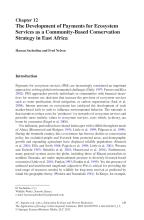Land Library Search
Through our robust search engine, you can search for any item of the over 73,000 highly curated resources in the Land Library.
If you would like to find an overview of what is possible, feel free to peruse the Search Guide.
/ library resources
Showing items 1 through 9 of 23.RCDC assigned a task of compiling a report on the functioning of PESA in the state of Odisha based both on secondary analysis and primary survey at field level, to a local consultant organization National Institute for Development Innovation(NIDI) in late 2010.
Audit of Forestland diversion and Compensatory afforestation by Comptroller and Auditor General of India.
In this publication two pioneering grassroots organisations from northern Tanzania examine and present their experiences and insights from their long-term work to secure the land rights of hunter-gatherer and pastoral communities.
This paper explores the development of a pilot PES scheme in the Tarangire ecosystem of Tanzania in response to specifi c wildlife declines and policy constraints. It charts the development of this initiative from its genesis based on PES experiences in Kenya.
This paper undertakes a critical analysis of issues related to women in agriculture in India with a view to provide directions to UN Women for future programmatic interventions and policy advocacy to address the gender gaps in agriculture.
The study on Property Rights of women in Tamil Nadu covers the property rights of Women belonging to various religious groups- Hindu, Muslims, Christians, Parsis and in particular Tribal Women of Nilgiris district in Tamil Nadu.
This report is based on research and analysis undertaken with the objective of deepening the understanding of CCAs in India, primarily to achieve two goals.
This manual has been prepared under the auspices of the Government of India and UNDP project on "Access to Justice for Marginalized People." The simplified user manual aims to raise awareness of two crucial legislative acts which together expand the legal rights of so
Like many of its neighbors, Tanzania is experiencing a well-documented surge of land grabbing related to investments in industries such as agriculture, biofuels, tourism, hunting, and forestry.




